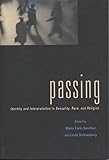Passing : Identity and Interpretation in Sexuality, Race, and Religion / ed. by Maria C. Sanchez, Linda Schlossberg.
Material type: TextSeries: Sexual Cultures ; 29Publisher: New York, NY : New York University Press, [2001]Copyright date: ©2001Description: 1 online resourceContent type:
TextSeries: Sexual Cultures ; 29Publisher: New York, NY : New York University Press, [2001]Copyright date: ©2001Description: 1 online resourceContent type: - 9780814781227
- 9780814786819
- 306
- HM1068 .P37 2001
- online - DeGruyter
| Item type | Current library | Call number | URL | Status | Notes | Barcode | |
|---|---|---|---|---|---|---|---|
 eBook
eBook
|
Biblioteca "Angelicum" Pont. Univ. S.Tommaso d'Aquino Nuvola online | online - DeGruyter (Browse shelf(Opens below)) | Online access | Not for loan (Accesso limitato) | Accesso per gli utenti autorizzati / Access for authorized users | (dgr)9780814786819 |
restricted access online access with authorization star
http://purl.org/coar/access_right/c_16ec
Passing for what you are not--whether it is mulattos passing as white, Jews passing as Christian, or drag queens passing as women--can be a method of protection or self-defense. But it can also be a uniquely pleasurable experience, one that trades on the erotics of secrecy and revelation. It is precisely passing's radical playfulness, the way it asks us to reconsider our assumptions and forces our most cherished fantasies of identity to self-destruct, that is centrally addressed in Passing: Identity and Interpretation in Sexuality, Race, and Religion. Identity in Western culture is largely structured around visibility, whether in the service of science (Victorian physiognomy), psychoanalysis (Lacan's mirror stage), or philosophy (the Panopticon). As such, it is charged with anxieties regarding classification and social demarcation. Passing wreaks havoc with accepted systems of social recognition and cultural intelligibility, blurring the carefully-marked lines of race, gender, and class. Bringing together theories of passing across a host of disciplines--from critical race theory and lesbian and gay studies, to literary theory and religious studies--Passing complicates our current understanding of the visual and categories of identity. Contributors: Michael Bronski, Karen McCarthy Brown, Bradley Epps, Judith Halberstam, Peter Hitchcock, Daniel Itzkovitz, Patrick O'Malley, Miriam Peskowitz, María C. Sánchez Linda Schlossberg, and Sharon Ullman.
Mode of access: Internet via World Wide Web.
In English.
Description based on online resource; title from PDF title page (publisher's Web site, viewed 01. Nov 2023)


